|
|
|
Sort Order |
|
|
|
Items / Page
|
|
|
|
|
|
|
| Srl | Item |
| 1 |
ID:
116683
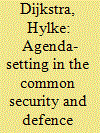

|
|
|
|
|
| Publication |
2012.
|
| Summary/Abstract |
The European Union (EU) has launched an impressive number of crisis management missions since its Common Security and Defence Policy became operational in 2003. This article analyses the agenda-setting phase of these civilian and military operations in order to explain why the EU has sent troops, policemen, judges, prosecutors and monitors across three continents. It presents an institutionalist perspective and argues that the former High Representative Javier Solana and his officials have been instrumental in putting various operations on the agenda. They have employed deliberate agenda-setting strategies, such as venue shopping, conflict expansion and issue framing, to further their bureaucratic interest of launching new missions. Solana and his officials had the ability to affect the agenda-setting process thanks to their pivotal position in policy making. This gave them with superior information on the state of play and an early mover advantage as well as strong international networks. The article provides empirical evidence from the crisis management missions in Aceh, Bosnia, Chad and Kosovo. It concludes with the changes to the Common Security and Defence Policy after the Treaty of Lisbon.
|
|
|
|
|
|
|
|
|
|
|
|
|
|
|
|
| 2 |
ID:
156237
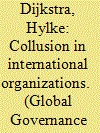

|
|
|
|
|
| Summary/Abstract |
In the theoretical literature on the authority of international secretariats, academics often dichotomize between states and secretariats. Even when they account for the fact that states are often divided, they normally adopt a two-step approach: states first resolve their own differences before they entertain relations with secretariats. This article provides an alternative perspective. It argues that individual or groups of states may collude with like-minded secretariats to achieve outcomes at the expense of other states. Working informally together is beneficial. States can benefit from the rational-legal, delegated, moral, and expert authority of secretariats. States and secretariats can also exchange resources. The article illustrates this perspective through two case studies: the NATO intervention in Libya in 2011 and the European Union's military operation in Chad in 2008.
|
|
|
|
|
|
|
|
|
|
|
|
|
|
|
|
| 3 |
ID:
125093
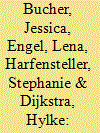

|
|
|
|
|
| Publication |
2013.
|
| Summary/Abstract |
The European Union member states split over the military intervention in Libya with France, Germany and the UK voting differently in the United Nations Security Council. This article compares news media in France and Germany to better understand the foreign policy decisions of these key actors. Using a newspaper analysis of 334 articles, it shows that the German domestic debate started very late and was much less stable than the French debate. This supports arguments that Germany's decision-making was erratic. The analysis, however, also shows that the German debate was comprehensive and included an extensive discussion of the legitimacy of intervention. This fits in well with the traditional reluctance of German foreign policy elites to support military action.
|
|
|
|
|
|
|
|
|
|
|
|
|
|
|
|
| 4 |
ID:
116354
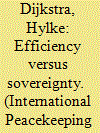

|
|
|
|
|
| Publication |
2012.
|
| Summary/Abstract |
This article analyses why the UN's members delegate resources to the UN Secretariat in the sensitive field of peacekeeping. It argues that the Secretariat can carry out planning and implementation functions more efficiently, but that the states remain wary of potential sovereignty loss. Through a mixed methods approach, this article provides evidence for such a functional logic of delegation, but shows that it only applies from the late-1990s on. The change in approach of states towards delegation can be explained by feedback from the dramatic failures of peacekeeping in Bosnia and Herzegovina, Rwanda and Somalia.
|
|
|
|
|
|
|
|
|
|
|
|
|
|
|
|
| 5 |
ID:
192524
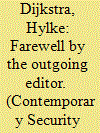

|
|
|
|
|
| Summary/Abstract |
After eight years as the Editor-in-Chief of Contemporary Security Policy, I am stepping down. Many editors have term limits imposed upon them. Others make editing their life’s work, often well into retirement. For me, it simply feels the right moment to pass the baton.
|
|
|
|
|
|
|
|
|
|
|
|
|
|
|
|
| 6 |
ID:
137643
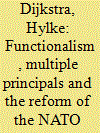

|
|
|
|
|
| Summary/Abstract |
The literature on international organizations tells us that diverging member states’ preferences and concerns about the loss of control are major obstacles to institutional reform. But what if changes in the international environment necessitate institutional reform? This article examines such dilemma in the case of the North Atlantic Treaty Organization (NATO). NATO has faced functional pressures to adjust its machinery to the post-Cold War era, but has at the same time seen its membership and the preference heterogeneity of the membership increase. The article finds that institutional change is indeed difficult with multiple principals and uncertainty about the consequences of reform. Yet modest reform has still taken place. Firstly, strong functional pressures can help the member states to overcome their differences concerning institutional reform. Secondly, lower-level incremental reforms, beyond the control of the member states, have made NATO a more efficient organization. The empirical focus is on the development of the understudied International Staff post-1989.
|
|
|
|
|
|
|
|
|
|
|
|
|
|
|
|
| 7 |
ID:
160734
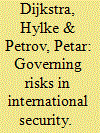

|
|
|
|
|
| Summary/Abstract |
Risks are omnipresent in contemporary international security. Despite a long tradition in security studies going at least back to Von Clausewitz, we consider that the topic of risk remains under-examined. This forum seeks to advance the research agenda on risk in security studies by showcasing work of scholars using advanced concepts of risk, based on insights from sociology, biology, psychology, and safety studies, to better understand the role of risk in international security. As a way of introduction, this short article sets out the main debates.
|
|
|
|
|
|
|
|
|
|
|
|
|
|
|
|
| 8 |
ID:
114209
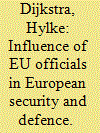

|
|
|
|
|
| Publication |
2012.
|
| Summary/Abstract |
European Union (EU) foreign policy has long been considered the domaine réservé of the member states. This article challenges such conventional state-centered wisdom by analyzing the influence of the Brussels-based EU officials in the Common Security and Defence Policy. Using four case studies and data from 105 semi-structured interviews, it shows that EU officials are most influential in the agenda-setting phase and more influential in civilian than in military operations. Their prominence in agenda-setting can be explained by their central position in the policy process. This allows them to get early involved in the operations. The absence of strong control mechanisms and doctrine in civilian crisis management gives them opportunities to affect civilian missions. Finally, EU officials direct civilian operations from Brussels, whereas the command of military operations is with the member states and NATO.
|
|
|
|
|
|
|
|
|
|
|
|
|
|
|
|
| 9 |
ID:
170754
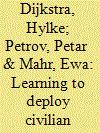

|
|
|
|
|
| Summary/Abstract |
nternational organizations continuously deploy civilian capabilities as part of their peacekeeping and crisis management operations. This presents them with significant challenges. Not only are civilian deployments rapidly increasing in quantity, but civilian missions are also very diverse in nature. This article analyses how international organizations have learned to deploy their civilian capabilities to deal with a growing number and fast evolving types of operations. Whereas the previous literature has addressed this question for individual international organizations, this article uniquely compares developments in the United Nations (UN), European Union (EU) and Organization for Security and Co-operation in Europe (OSCE), three of the largest civilian actors. Drawing on the concept of organizational learning, it shows that all three organizations have made significant changes over the last decade in their civilian capabilities. The extent of these changes, however, varies across these organizations. The article highlights that the EU, despite its more homogeneous and wealthier membership, has not been able to better learn to deploy its civilian capabilities than the UN or OSCE. We show that the ability of these organizations to learn is, instead, highly dependent on institutional factors.
|
|
|
|
|
|
|
|
|
|
|
|
|
|
|
|
| 10 |
ID:
099178
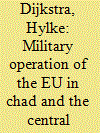

|
|
|
|
|
| Publication |
2010.
|
| Summary/Abstract |
This article evaluates the military operation of the European Union in Chad and the Central African Republic in 2008-09. Despite a promising conceptual approach and close cooperation with the United Nations (UN), the operation created significant political problems between member states. It led to a split - France arguing that it carried too much of the burden and Germany and the United Kingdom sensing that they were sponsoring a pet project. When the UN failed to achieve its ambitious promises to establish a parallel presence and follow-on force, tensions arose with the UN as well. This type of operation is therefore unlikely to be repeated in the near future.
|
|
|
|
|
|
|
|
|
|
|
|
|
|
|
|
| 11 |
ID:
152382
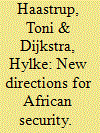

|
|
|
|
|
| Summary/Abstract |
African security, particularly conflict-related political violence, is a key concern in international relations. This forum seeks to advance existing research agendas by addressing four key themes: domestic politics and peacekeeping; security sector reform programs; peace enforcement; and the protection of civilians. Each of the articles in this forum makes a case for analyzing African agency when it comes to African security. As a way of introduction, this short article sets out the main debates and concludes by providing further directions for future research.
|
|
|
|
|
|
|
|
|
|
|
|
|
|
|
|
| 12 |
ID:
148298
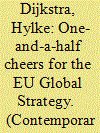

|
|
|
|
|
| Summary/Abstract |
EU High Representative Federica Mogherini presented her EU Global Strategy (EUGS) in June 2016. Encircled by security crises, it is difficult to think of something more important for Europe than collective action with the aim of weathering the storm. The EUGS, in this respect, seeks to define common ends and identify means. So what do we make of the EUGS? What does the EUGS tell us about the current role of the EU in global affairs? And how will the withdrawal of the UK from the EU affect foreign and security policy? As a way of introduction to the forum, this article notes that the EUGS focuses on the neighbourhood, puts the interests of European citizens first, identifies civilian means, and has created momentum on security policy. The key question, however, remains whether there is any interest in the EUGS beyond the foreign policy elites.
|
|
|
|
|
|
|
|
|
|
|
|
|
|
|
|
| 13 |
ID:
186556
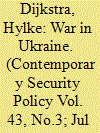

|
|
|
|
|
| Summary/Abstract |
On February 24, 2022, Russia invaded Ukraine. After the 2008 war in Georgia, the 2014 annexation of Crimea, and the continuous conflict in Donbas for nearly eight years, Russia's massive military buildup in the fall of 2021, including in Belarus, the actual invasion should not have come as a surprise. For many of us, it did. And the hostility and brutality since have been shocking.
|
|
|
|
|
|
|
|
|
|
|
|
|
|
|
|
| 14 |
ID:
192525
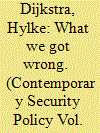

|
|
|
|
|
| Summary/Abstract |
When Russia started its war against Ukraine, 20 months ago, it took many observers by surprise. As an academic journal, which is committed to providing policy-relevant analysis of contemporary security issues, we felt it was our duty to make our pages available to cover the war in Ukraine. We did so in a special forum on “War in Ukraine,” published in our July 2022 issue, which we considered a first attempt at understanding this war and its immediate consequences.
|
|
|
|
|
|
|
|
|
|
|
|
|
|
|
|
|
|
|
|
|